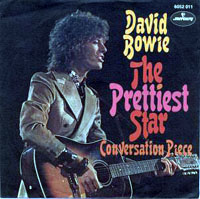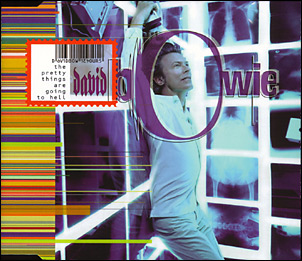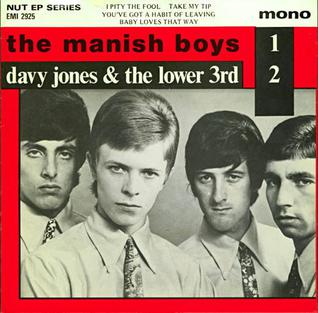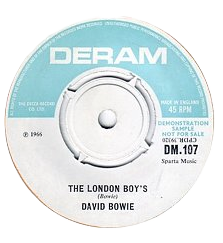
David Bowie is the debut studio album by the English musician David Bowie, originally released in the United Kingdom on 1 June 1967 through Decca subsidiary Deram Records. Produced by Mike Vernon and recorded from November 1966 to March 1967 in London, the album followed a string of singles Bowie released for Pye Records that failed to chart. Vernon hired numerous studio musicians for the album's sessions; Bowie and his former Buzz bandmate Derek Fearnley composed music charts themselves using a musical guidebook.

David Bowie is the second studio album by the English musician David Bowie, originally released in the United Kingdom on 14 November 1969 through Mercury affiliate Philips Records. Financed by Mercury on the strength of "Space Oddity", the album was recorded from June to October 1969 at Trident Studios in London. Gus Dudgeon produced "Space Oddity", while Tony Visconti produced the rest of the album. It featured an array of collaborators, including Herbie Flowers, Rick Wakeman, Terry Cox and the band Junior's Eyes.

The Man Who Sold the World is the third studio album by the English musician David Bowie, originally released through Mercury Records in the United States on 4 November 1970 and in the United Kingdom on 10 April 1971. Produced by Tony Visconti and recorded in London from April to May 1970, the album features the first appearances on a Bowie record of future Spiders from Mars members Mick Ronson and Mick Woodmansey.

"I Dig Everything" is a single by the English singer-songwriter David Bowie. It was his final single for Pye Records, released on 19 August 1966. The track was originally demoed with Bowie's then-band, the Buzz, but producer Tony Hatch was unhappy with their efforts and replaced them with session players. It is a pop song that musically and lyrically reflected the mid-1960s Swinging London era. The single was another commercial failure and resulted in the label dropping him. The original recording was included on the Early On (1964–1966) compilation in 1991.

"The Prettiest Star" is a song by the English musician David Bowie, originally released on 6 March 1970 through Mercury Records as the follow-up single to "Space Oddity". A love song for his soon-to-be wife Angie, it was recorded in January 1970 at Trident Studios in London and featured Marc Bolan on guitar, who was brought on by producer Tony Visconti. Despite praise from music journalists, the single flopped and failed to chart. Years later, Bowie rerecorded the track for his 1973 album Aladdin Sane. On this more glam rock influenced take with lyrics matching themes on the album, Mick Ronson recreated Bolan's guitar part almost note-for-note. The remake was more well-received.
"Black Country Rock" is a song by the English musician David Bowie, released on his 1970 album The Man Who Sold the World. The song was recorded in May 1970, with sessions taking place at Trident and Advision Studios in London. The lineup featured Bowie on lead vocals, guitarist Mick Ronson, bassist/producer Tony Visconti, drummer Mick Woodmansey and Ralph Mace on Moog synthesiser. The track was mostly composed by Ronson and Visconti, who developed it using a basic song sketch from Bowie. Labelled under the working title "Black Country Rock", Bowie used the title to write the lyrics towards the end of the sessions, resulting in a repeated two-line verse and chorus. A blues rock and hard rock number, Bowie imitates T. Rex's Marc Bolan in his vocal performance.

"Stay" is a song by the English musician David Bowie, released on his 1976 album Station to Station. The song was recorded in late 1975 at Cherokee Studios in Los Angeles. Co-produced by Bowie and Harry Maslin, the recording featured guitarists Carlos Alomar and Earl Slick, bassist George Murray, drummer Dennis Davis, pianist Roy Bittan and Warren Peace on percussion. The track features prominent dual guitar work from Slick and Alomar, who mostly composed it in the studio. Based on the chord structure of "John, I'm Only Dancing (Again)", a funk reworking of "John, I'm Only Dancing" (1972), "Stay" emulates funk rock, soul and hard rock. The song's lyrics are abstract and relate to love.
"It's No Game" is a song written by English musician David Bowie for his 1980 album Scary Monsters , featuring lead guitar played by Robert Fripp. The song is split into two parts, opening and closing the album. "(No. 1)" is musically sinister, featuring Bowie screaming lyrics and Japanese narration provided by actress Michi Hirota. "(No. 2)", a stark contrast to "(No. 1)", is much calmer, which Bowie's biographers symbolise as Bowie facing the same situation in "(No. 1)", but after the album's duration.

"Survive" is a song by the English musician David Bowie from his 1999 album Hours. It was later released in remixed form as the album's third single on 17 January 2000, reaching number 28 in the UK. Written by Bowie and Reeves Gabrels, it is a reflective number detailing the end of a relationship. Musically, it recalls the sound of Bowie's folk rock music of the late 1960s, and 1971's Hunky Dory. Its music video echoes the reflective quality of the recording, portraying Bowie levitating at a kitchen table with an egg. Praised as a highlight of Hours, Bowie performed "Survive" frequently through 1999 and 2000.

"The Pretty Things Are Going to Hell" is a song by the English musician David Bowie from his 1999 album Hours. Written by Bowie and Reeves Gabrels, its title references past songs such as "Oh! You Pretty Things" and the Stooges' Raw Power track "Your Pretty Face Is Going to Hell". On Hours, the song is a rockier number that contains elements of 1970s glam rock. The lyrics offer views on disillusionment and aging. The song was first released in a different mix in the film Stigmata before being released as the first single from the album in Australia and Japan, replacing "Thursday's Child". An unreleased music video was filmed that depicted Bowie encountering several of his past personas. It was performed live in 1999 and 2000.
"Shadow Man" is a song written by the English singer-songwriter David Bowie. It was first recorded on 15 November 1971 at Trident Studios in London during the sessions for The Rise and Fall of Ziggy Stardust and the Spiders from Mars (1972) and left unreleased. A folk ballad, the lyrics discuss topics of self-identity and doubling, and the impact one's present self has on their future lives, themes some linked to the Shadow concepts of Carl Jung.

"You've Got a Habit of Leaving" is a song by the English singer-songwriter David Bowie, recorded and released as a single on 20 August 1965 through Parlophone. Released under the name Davy Jones, it featured his band at the time, the Lower Third, whose contributions were uncredited. Produced by Shel Talmy and recorded in early July 1965, the single marked a departure from the Americanised R&B of his two earlier singles into Who-style mod music. The original recording later appeared on the compilation albums Early On (1964–1966) (1991) and Nothing Has Changed (2014).
"Baby Loves That Way" is a song written by David Bowie in 1965 and released as the B-side of single "You've Got a Habit of Leaving" under the name Davy Jones with his band at the time, the Lower Third, who were uncredited. Bowie remade the song during the sessions for his Toy album in 2000, which was officially released in 2021.

"Can't Help Thinking About Me" is a song written by the English musician David Bowie and recorded with his band the Lower Third. Released as a single by Pye Records on 14 January 1966, it was the first one issued under the "David Bowie" name after previously performing as Davy Jones or Davie Jones. The recording was produced by Tony Hatch, who also contributed piano. The session took place on 10 December 1965 at Marble Arch Studios in London. A rewrite of Bowie's "The London Boys", the song concerns a boy found guilty of an act that decides to leave town to start anew. It is noted by biographers as showcasing Bowie's growth as a songwriter, displaying themes he would utilise in his later work. Musically, the song explores the contemporary mod sound of the Who and the Kinks.

"The London Boys" is a song by the English musician David Bowie. It was first released as the B-side of the single "Rubber Band" in the United Kingdom on 2 December 1966. It was originally written and demoed in 1965 with the Lower Third for potential release as the artist's debut single for Pye Records but it was rejected. After a year of rewrites, he recorded a new version with a new band, the Buzz, which helped secure him a record contract with Decca-subsidiary Deram Records. Unlike the A-side, "The London Boys" retains the Mod feel of Bowie's previous singles. The dark lyrics concern a 17-year-old who leaves home for London and becomes embroiled in the Mod scene, turning to pills to fit in. Like his previous singles, it failed to chart. Decca later issued it as an A-side in 1975.

The World of David Bowie is a compilation album by the English singer-songwriter David Bowie, released on 6 March 1970 by Decca Records as part of their The World of... series following Bowie's success with the "Space Oddity" single. It primarily consists of material he recorded in 1967 for Decca subsidiary Deram, including all but four tracks from his debut album David Bowie, as well as three previously unreleased songs — "Karma Man", "Let Me Sleep Beside You" and "In the Heat of the Morning" — and the 1966 B-side "The London Boys". The tracklisting was approved by Bowie himself, while the sleeve photo was provided by David Bebbington. The album was reissued in April 1973 with a Ziggy Stardust-era sleeve photo.

Toy is a studio album by the English musician David Bowie, posthumously released in November 2021. It was recorded from July to October 2000 in New York City and featured re-recordings of songs Bowie recorded between 1964 and 1971, along with a couple of new tracks. The project was co-produced by Bowie and Mark Plati and featured musicians from Bowie's then-touring band—Plati, Earl Slick, Gail Ann Dorsey, Mike Garson and Sterling Campbell—with overdubs from Lisa Germano, Gerry Leonard and Cuong Vu.
"Let Me Sleep Beside You" is a song written and recorded by the English singer-songwriter David Bowie. It was recorded on 1 September 1967 at Advision Studios in London and marked the beginning of Bowie's working relationship with producer Tony Visconti, which would last for the rest of Bowie's career. A departure from the pop and music hall-influenced material of Bowie's 1967 self-titled debut album and other singles for Deram Records, the song displays a more rock-oriented sound with a cello arrangement from Visconti. The impressionist lyrics also depart from Bowie's prior works, describing love using the act of sleeping together rather than through emotional attachment. The song was rejected by Deram for release as a single, purportedly due to the risqué title. It remained unreleased until 1970's The World of David Bowie compilation.
"Silly Boy Blue" is a song written and recorded by the English singer-songwriter David Bowie. Originally demoed in 1965 as a mod-influenced track about a teenage runaway, it was revised in 1966 with new lyrics and released on Bowie's self-titled debut album in June 1967. This version reflects Bowie's fascination with Tibetan Buddhism, featuring various spiritual and geographic references in the lyrics and varied instrumentation such as a trumpet, cello and Chinese gong. Bowie remade the song twice during his stint with the Riot Squad in April 1967: as an instrumental for live performances and acoustically, which has appeared on compilations.













